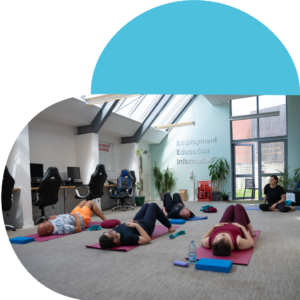
Our priority outcome: To improve the physical health of people with mental health issues
Life expectancy for people with severe mental illness is 15–20 years lower than UK averages, mainly due to preventable physical illness.

Context and key challenges
People living with severe mental illness (SMI) face one of the UK’s greatest health inequality gaps. Factors can include side effects of anti-psychotic medication, lifestyle, and difficulties with mainstream health services. People with mental health needs are statistically less likely to have routine checks (blood pressure, weight and cholesterol) that might detect early symptoms of physical health conditions; and less likely to get help with giving up smoking, drinking less alcohol, or healthier diet and exercise.
What we offer
Physical activity is an important part of the ‘treatment’ for many of the people we support. Whether it’s walking, gardening, yoga or sports, being physically active can play an important role in being mentally healthy. We work with many voluntary and community groups – such as the Mosaic Clubhouse, Loughborough Farm and Brixton Pumas – as well as Social Prescribers who work with GPs to ‘prescribe’ such physical activities for those who would benefit.
We also try to ensure that we carry out the routine health checks mentioned above for those we support, rather than expecting GPs to always do them.
Our impact
We continue to focus on ensuring those we support have regular health checks, such as blood pressure, blood sugar levels, weight and so on. Using data to focus their efforts, our Low Intensity Treatment Team were able to increase the proportion of people they supported who had a BMI measurement from 52% to 82% and an alcohol assessment from 13% to 82% between December 2021 and March 2022.
Our next steps
We are further developing our Staying Well offer to support more people to thrive in their communities by working with GPs, Social Prescribers and local voluntary and community groups.
We intend to increase the number of people who receive routine health checks by using data to identify those who need them.
Case study: Brixton Pumas

Can you help us?
We are introducing a short survey that all those who use our services will be invited to complete (online or on paper). It will take less than 3 minutes and will tell us how well we are doing and what we need to improve. Later this year we will report more detailed information on our service performance and impact and ask you for your views and ideas. Click here if you would like to complete this survey or scan this QR code:
Scan to take a short (less than 3 minutes) service user survey.